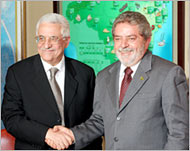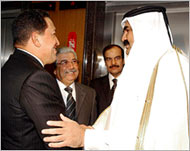Brazil summit policies at odds with US
South American and Arab leaders at their first regional summit have endorsed a declaration condemning the Israeli occupation of Palestinian territory and calling for trade liberalisation to lift the planet’s poor out of misery.

Banding together in an event aimed at dampening the dominance of developed countries, they ended the two-day Summit of South American-Arab Countries by staking out positions that are at odds with US policy on several fronts.
Venezuelan leader Hugo Chavez and American-backed Iraqi President Jalal Talabani joined dozens of other nations in approving a Declaration of Brasilia condemning terrorism, denouncing US sanctions against Syria and supporting moves to give developing countries more clout on the international stage.
The summit brought 9000 troops to the Brazilian capital in the tightest security in years. Tanks were posted outside the convention centre, where 15 heads of state and top officials from 34 South American, Middle Eastern and North African nations met.
Pushing a goal he has pursued since becoming the country’s first elected leftist leader, Brazilian President Luiz Inacio da Silva urged participants to fight for free-trade rules that help the developing world’s masses instead of rich countries and multinational corporations.
Palestinian crisis
Arab states, under pressure from Washington to reform authoritarian governments, chose to focus on the Palestinian crisis.
 |
|
Palestinian President Mahmoud |
The declaration calls for tighter political and economic links between the regions but demands that Israel disband settlements and retreat to its borders before the 1967 Mideast war.
The summit lost lustre with the absence of the strongest voices in the Arab world, such as Egypt, Saudi Arabia, Jordan and Syria.
Argentine President Nestor Kirchner jetted out on Tuesday night in a move interpreted as a snub of Silva. Argentina and Brazil, the continent’s two largest economies, historically have jockeyed to be South America‘s leading power, and Kirchner reportedly is upset with Silva’s insistence that Brazil should be given a permanent seat on the UN Security Council.
Leaders from Qatar and Chile, along with high-level delegations from Saudi Arabia and Jordan, also left before the closing ceremony.
In all, seven of 22 Arab heads of state attended, while eight of the 12 South American leaders came to Brasilia. The United States requested to attend as an observer, but Brazil refused.
Terrorism
The document denounces terrorism but asserts the right of people “to resist foreign occupation in accordance with the principles of international legality and in compliance with international humanitarian law”.
 |
|
Seven of 22 Arab heads of state |
The clause – a clear reference to the Palestinian group Hamas and Lebanon‘s Hizb Allah, groups condemned by the US and Israel – drew criticism from Jewish groups.
On Iraq, it stresses respect for the “unity, sovereignty and independence of Iraq and of not interfering in its internal affairs.”
Iraqi President Jalal Talabani told summit leaders he wanted their help to fight terrorism, which he described as “an international curse”.
“For every one American killed, 300 innocent Iraqis are killed,” he said.